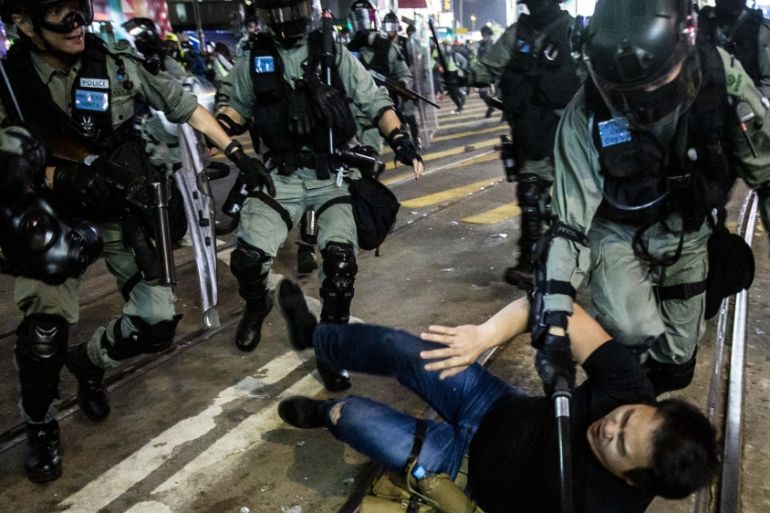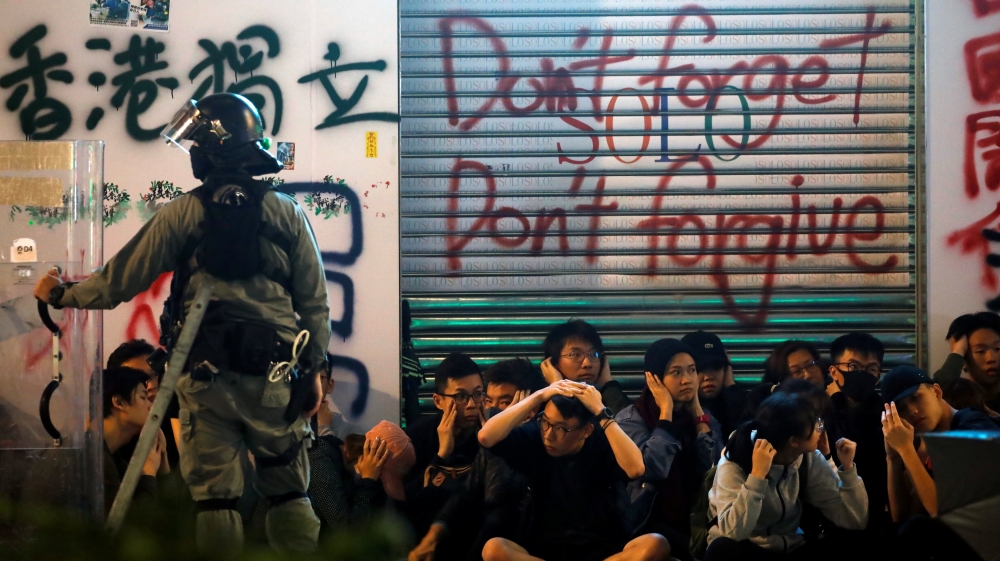First Hong Kong rally of 2020 ends in clashes
As thousands gather to take movement into new year, police fire tear gas and arrest ‘pro-democracy’ protesters.

Hong Kong – Determined to carry their fight into the new year, protesters kicked 2020 off with a march from the city’s central park.
Thousands of demonstrators, mostly dressed in signature black attire, started out peacefully along the six-lane main road from Victoria Park to the downtown business district.
Keep reading
list of 4 itemsHong Kong’s new security law comes into force amid human rights concerns
Hong Kong passes tough new national security law
What is Article 23, Hong Kong’s new draconian national security law?
“Fear not persecution! Release all political prisoners!” they shouted. “Investigate police brutality!”
About three hours in, clashes erupted. Police fired tear gas, deployed water cannon and started a wave of arrests – about 400 protesters were arrested by nightfall.
Organisers urged demonstrators to leave after police revoked the permission to march.
Wednesday’s march was led by some of the district councillors who were sworn in only hours earlier.
They were swept into office in late November after nearly 1.7 million voters handed a landslide victory to the so-called pro-democracy camp with a record turnout of 71 percent.

No sign of public anger abating
Even though freedom of assembly is enshrined in Hong Kong‘s own constitution, an ordinance inherited from the colonial era mandates a letter of no objection from the police for marches of more than 30 people.
In recent months, police have rejected requests for such letters, citing clashes at previous gatherings.
Still, many of the demonstrators on Wednesday shrugged off the dispersal order and continued marching.
“I came out to show support,” Popz Au, 36, told Al Jazeera. “I’ll carry on for as long as I can. Otherwise there’ll be no hope for our city.”
Last June, two marches that each drew between one and two million people forced Chief Executive Carrie Lam to shelve a controversial extradition bill that had sparked the protests, which have since evolved into a wide-scale movement for greater democracy in the semi-autonomous territory.
Although the extradition bill was finally withdrawn four months later in October, public anger has remained intense, driven by Lam’s refusal to address protesters’ other demands.
These include an independent inquiry into alleged police brutality; amnesty for the more than 1,000 people charged with offences stemming from the protests; a retraction of the police assertion that protesters are guilty of rioting; and universal suffrage to elect the full legislature and chief executive.
|
|
At the stroke of midnight local time (16:00 GMT), Hong Kong Watch, a UK-based advocacy group, issued an open letter signed by 40 parliamentarians, religious leaders and other prominent figures from 18 countries including Canada, Germany, India and Indonesia, Malaysia, South Korea and the United States.
They called on Lam to heed the protesters’ demands for an independent investigation into the police and the right to elect her successor and all legislators.
A devout Catholic, Lam was last seen in public attending Christmas mass with her family and visiting the police headquarters, handing out boxed lunches.
Protest anniversaries
Hong Kong citizens have a tradition of protesting on certain anniversaries.
June 4 is remembered as the date of the 1989 crackdown on student demonstrators in Beijing’s Tiananmen Square. July 1 marks the day the former British colony returned to Chinese sovereignty in 1997. Both dates have long been marked on the city’s activism calendar.
New Year’s Day is a recent addition, with the first march called on the dawn of 2010 for the right to vote for the semi-autonomous Chinese territory’s highest office of chief executive.
Before halting the march on authorities’ order, organisers estimated the turnout at more than a million, compared with the police figure of 60,000 people.
Either count made Wednesday’s event the largest New Year’s Day march in Hong Kong, a city of 7.4 million.
“I’m here today because I can’t bear to think our younger generations may face a future of perpetual struggle for their freedoms and rights,” said Jackson Chan, 30, as he reached downtown, the intended destination of the march.
“My new year’s resolution is for our government to offer a resolution to our demands,” said Chan.